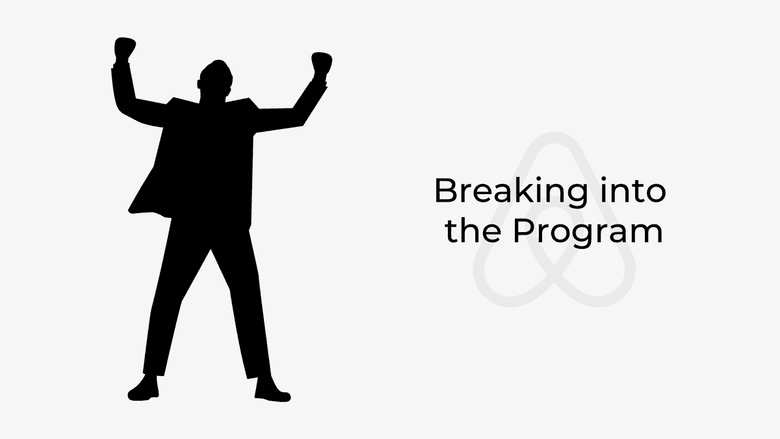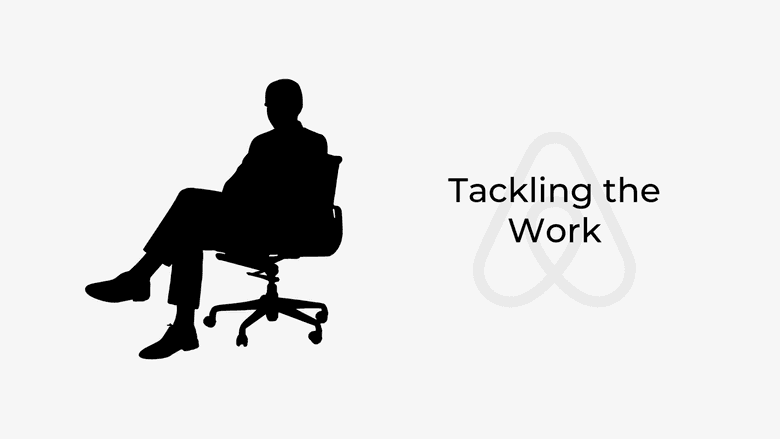Interview with a Former Airbnb Intern
Former Airtern Brian Zhu discusses his experiences in the program, and what future Airterns have to look forward to.
In addition to its success and widespread publicity (even during its startup days), Airbnb is well-known for its commitment to progress. From treating its platform like a global community to launching anti-discrimination initiatives in an effort to increase accessibility, Airbnb aims to use its power to change the world for the better.
The online marketplace has had plenty of ups and downs over the course of the COVID-19 pandemic, from laying off 25% of its workforce to launching a successful IPO. Through its hardships, the company decided to cancel its summer internship program last year, along with several other tech companies like Yelp and StubHub. And while Airbnb now seems to be recovering from that initial shock, insiders say the program likely won’t run like normal until 2022.
This news comes as a disappointment to the undergrad tech community-- the Airbnb internship is regarded as one of the best in the industry, with 5 out of 5 stars on Glassdoor and positions suited to a variety of interests, from data science to operations. In the meantime, Brian Zhu, a software engineering Airtern in 2017, talked to us about what prospective interns have to look forward to in the coming years.

How did you apply to the Airbnb internship?
I went to the Airbnb booth at one of the career fairs at UT Austin, I talked to the recruiters, and they told me to submit my resume online, so that’s what I did. I think universities often have recruiters targeted specifically for that university. And so, after I applied online, someone reached out to me and said, “Hey, we love your experience, and we’d love to schedule an interview.”

Some recruiters will schedule interviews on the spot. Other recruiters are just there for the information, but they wouldn't necessarily give you an edge because they’ll just tell you to apply online. I’m not 100% sure, but I believe Airbnb goes more for the information.
When I talked with other Airbnb interns, I found out that most of them had referrals, so I was actually the only one from my school who didn’t have a referral and still got the internship.
What do you think helped you land the job?
I went to UT Austin as a computer science major, and they put a big emphasis on trying to get internships. So for me, this wasn’t my first internship. I had one internship at Tableau before in Seattle, and sometimes, I think having a good internship before applying to a company with a high bar is really helpful.
What was the interview process like?
I think Airbnb actually does more interviews than the average internship. So we had one initial phone screen, and then after the phone screen, if you pass, you have three additional interviews-- two coding interviews and one behavioral/company culture interview.

They didn’t have a superday. I think they evaluated based on the performance from each person, but they didn’t synchronize. The last interview wasn’t necessarily trying to judge your competency. It was called a core values interview. It lasted for 45 minutes, and they would ask you questions to judge if you would fit in the Airbnb culture.
One example of a question was like, “Tell me about a time where you had to be a host,” because “be a host” is one of the core values at Airbnb-- not necessarily hosting someone in your house, but an instance where you had to welcome someone in or help them out. Another example is, “If you had to pick a present for somebody, what would it be?” It was a lot of these warm fuzzy interview questions that basically try to determine whether you’ll be nice to other people.
Do you have any background on those values before the interview?
Yeah, so there’s four core values at Airbnb-- there’s “champion the mission,” “be a host,” “be a ‘cereal’ entrepreneur,” and “embrace the adventure.” I didn’t really prep, but you should answer such that you feel that the interviewer would want to work with you after the conversation.
But I wouldn’t say the last interview was necessarily the deciding factor, it was more of a double-check. So if you already passed all the three coding interviews and you didn’t screw up the last interview, you would get the offer. To actually pass the interviews, I think the core component was the coding interviews.
So there were three of them-- one in the first round, and two in the second round. These are like the typical LeetCode questions. You go on CoderPad, where the interviewer could look at your code, they give you the question, and you try to solve that within 45 minutes.
Is there an initial coding challenge when you first apply?
In my case, there wasn’t. The initial challenge was the first interview with the coding session. However, I think the year after me, they had an additional HackerRank challenge that you complete before getting the first interview.
Were there any surprises in the interview questions?
The format wasn’t a surprise, but I think the questions at Airbnb were harder than the average questions you would get at other companies. So on LeetCode, they have levels, like LeetCode Easy, LeetCode Medium, LeetCode Hard. I think the Airbnb ones would be LeetCode Hard. The other thing is, at Airbnb, the code has to compile in order for you to pass. So not only do you have to write the code, but you had to put in the test data and see the correct output.
You could debug on the spot, but at the end, you were supposed to get the correct output. At some other companies, if it’s a whiteboard, you can’t really compile, so there may be bugs in the code or you could write pseudo code. But for Airbnb’s interviews, you have to have the code compile. And if you interview in person, they also have a laptop in front of you so they can make sure that the code compiles.

What was the structure of the internship?
It was a three-month internship on-site, so you got to pick whether you go to Seattle or San Francisco. I’d already interned in Seattle, and I also wanted to check out what the Bay Area was like, and also, this was the headquarters, so I chose SF.
Before you go to the internship, you get a questionnaire you have to fill out, and that asks not only for your dates or location, but also which team would you like to join. For example, at Airbnb, we have the host team, the guest team, the trust team-- you could pick one of those categories. And then once you get to Airbnb, you’re assigned to one engineering team of five to ten people, usually. So you have one person who would be your intern manager. Usually that person is a senior software engineer, but they also act as an intern manager and not an engineering manager. So they’re the person responsible for the execution of your projects and evaluations and everything.
What were the projects like? Did you work on frontend, backend or full stack?
It varies depending on the team and circumstances, but in general, the first week would be on-boarding, and then the rest of the time would be working on the intern project. I think it’s different now, but when I was at Airbnb, it would be an end-to-end feature which would go live to production. Not necessarily a UI thing, but it could be on the backend. And the intern manager would scope it out for you before you start the internship. I think the next year, they changed it so that it would be more like prototypes or internal tools, rather than customer-facing features.
What was your biggest challenge during the internship?
Good question. A lot of the tech stack, I wasn’t familiar with, or I’d never worked with before. For example, we worked in Ruby on Rails and in React. I actually hadn’t worked with those technologies before, so it was just trying to learn the tech stack that Airbnb uses and work with that.

I think that even if you haven’t worked with the tech stack that the company uses, that shouldn’t prevent you from applying because I think almost everyone learns on the job. So I was still able to get the return offer even though I’d never worked with the tech stack that Airbnb uses because I ramped up during the internship.
What did the evaluation process for new grad return offers look like?
They have two evaluations-- one is the midterm, and one is the final. The midterm is more like a progress check to see whether you’re on track. And then they’ll tell you, like, “Hey, you’re on track, just finish this,” or, “Hey, you’re falling behind. You have to get your game together.” There’s also performance reviews for full-timers, so basically you did the same thing for the intern evaluation. For the midterm, we had to ask for feedback from three or four other people on the team. And then you had to write a self-assessment, and then your intern manager would write an assessment of your progress.
For the final, you would do the same thing, but there’d also be calibration. So once all the assessments had been written, your intern manager would go into a room with a bunch of other intern managers and real managers, they would present the case for what you’ve done, and then they would vote on whether the person successfully completed the project.
During actual performance evaluations, they’ll have a scale for, like, Meets Some Expectations, Meets All, Exceeds Expectations, Greatly Exceeds. For the internship at Airbnb, it’s only the binary. Everyone gets the same return offer, unlike at some other companies, which give a higher return offer if you get a better review.
At Airbnb, I think if everyone successfully completed the project, then everyone could get the offer. At some places, they weed out people during the internship. At Airbnb, I think they weed out most people during the interview, so the people they do get usually would get the offer if they did well.
👉 Read Next: Will Airbnb IPO soon?

Is there a mentorship program?
The intern manager is supposed to be your mentor too. However, there’s an internship buddy program, where a full-time employee gets paired with two other interns, and they’re not your official manager or intern manager. They’re more like people who can answer questions and offer advice and support.

Where did you live during the internship?
They give you a salary, but they also give you a housing stipend. Some companies literally house you, but at Airbnb, they give you money, and you find your own place. So I booked an Airbnb with some other Airbnb interns, and we walked or biked to work.
What kind of programming and perks were there for the interns?
There was at least one event every two weeks. There was one where they rented out some event space in the Golden Gate Park. They had live music, they had a lot of free food, you could also go to the beach. They also rented out a food truck, just for the interns and the intern manager.
In addition to events, you also had smaller groups, where you had a budget for, like, fun activities. Each person has a $100 budget, so we went to an escape room and we went to restaurants.
They also hosted a talk with every person on the executive team. For each executive, they’d have a one-hour fireside chat. For example, they hosted one with Brian, Nate, and Joe-- each was a separate event: the CFO, the CTO, all the other executives. It was actually a lot of events. I had to not attend some because there were so many.
Were managers and team members pretty understanding of your other commitments?
Yeah, I think Airbnb is really flexible, so no one’s keeping track of when you’re at your desk. Some people just played ping pong for a while and went back to work, and no one blinked. You could even take your laptop and work in one of the mini-kitchens, and people wouldn’t ask, “Where did you go?” The main output is whether or not you finished your projects at the end of the internship.
What’s your biggest takeaway from the program?

I think the reason I wanted to work at Airbnb in the first place was because I thought it was an amazing company doing something that’s really good for the world, and potentially I could get that through osmosis by working there. The people there were great, and the culture was pretty good too. Everyone was really supportive and nice to you, and it was a pretty fun place to work. It was really well put together, and they kind of made it magical.
👉 Read Next: What benefits keep Airbnb's employment offers competitive?
*Interview has been edited for length and clarity
The information provided herein is for general informational purposes only and is not intended to provide tax, legal, or investment advice and should not be construed as an offer to sell, a solicitation of an offer to buy, or a recommendation of any security by Candor, its employees and affiliates, or any third-party. Any expressions of opinion or assumptions are for illustrative purposes only and are subject to change without notice. Past performance is not a guarantee of future results and the opinions presented herein should not be viewed as an indicator of future performance. Investing in securities involves risk. Loss of principal is possible.
Third-party data has been obtained from sources we believe to be reliable; however, its accuracy, completeness, or reliability cannot be guaranteed. Candor does not receive compensation to promote or discuss any particular Company; however, Candor, its employees and affiliates, and/or its clients may hold positions in securities of the Companies discussed.
